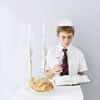Question:
Why do Jewish holidays begin at nightfall? For example, Purim starts this Monday night, and is over Tuesday night, and that is considered one day.
Answer:
Your question touches upon a fascinating concept - the passage of time.
According to the Jewish calendar, not only Jewish holidays begin at nightfall, but every day does.
This is based on the story of creation in Genesis, where at the end of each day it says, "And it was evening, and it was morning; day one", "And it was evening, and it was morning; the second day" etc. By mentioning evening before morning, the Torah defines a day as beginning with the evening, followed by the morning.
This definition of the passage of time is not only relevant to how we set up the calendar. It has profound implications as to our attitude to life itself.
Everyone agrees that life is full of ups and downs. We go through periods where the sun is shining upon us and we feel on top of the world, only to turn a corner and be faced with difficulties and obstacles that drag us down. But it isn't long before something pleasant comes our way to pick us up again.
The question is: which one wins the day, the ups or the downs? In other words, is life a series of disappointments dotted by the occasional glimmer of hope, only to be crushed by another surge of gloominess? Or are we on a journey upwards, with challenges along the way to make us even stronger in our quest for enlightenment?
Does darkness extinguish light, or does light conquer darkness? Does night follow day or day follow night?
The Jewish view is clear. "And it was evening, and it was morning." First the night, then the day. Darkness is a pathway to the sunrise hiding behind it. A challenge comes our way only to help us tap in to and reveal our inner powers that have until now remained unfathomed.
That's Jewish time - the comfort in knowing that no matter how dark it may seem, it is light that will have the last word.






Join the Discussion